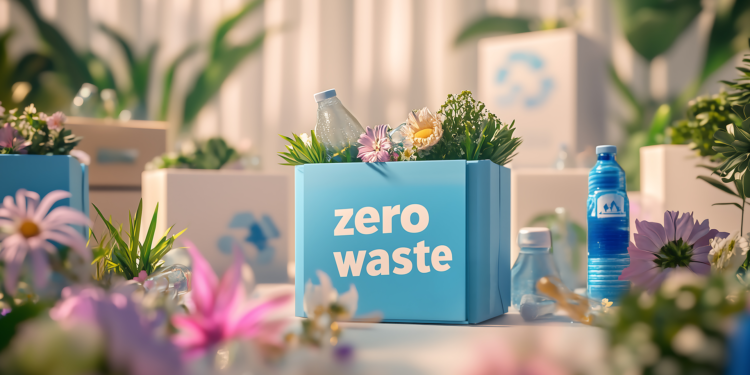Zero waste is an easy and powerful idea for mindful living with significant environmental advantages. No waste. The phrase is becoming more and more well-known as individuals try and want to live more sustainably. What does it actually mean, though? Basically, this concept is a way of life and a philosophy that promotes material reuse, reduction, and recycling to reduce the quantity of waste that is produced. The ultimate objective is to make as little ideally none at all waste in the first place rather than creating waste and now making measures to sort it.
At first, the idea of zero waste could seem vast. After all, how can anyone genuinely produce zero waste in a world where rapid fashion, spontaneous goods, and single-use plastics are the norm? The secret is to realize that achieving this is about making thoughtful decisions that lessen our impact on the environment.
However, what benefits does adopting this lifestyle offer to the environment? The advantages are extensive.
- By concentrating on cutting waste, we lessen the demand for fresh resources, lowering pollution, preserving energy, and safeguarding natural ecosystems.
- By selecting reusable products over throwaway ones, we help lessen the amount of garbage that ends up in our landfills and oceans, protecting animals and lessening the negative consequences of plastic pollution.
Living with zero waste also encourages more conscientious consumption. It makes us consider carefully what we purchase, use, and discard. That is for our betterment too.
Imagine living in a society where nothing is wasted, where everything you use has a use and nothing ends up in the trash or floating in the water. Although it may seem like a far-off imagination, the zero waste movement has this as its main objective. Living without wasting is a powerful means of lessening our influence on the environment and building a more sustainable future.
An important thing is the fundamental idea behind zero-waste living is to reconsider how we make, use, and discard items. It has nothing to do with some hard rocket science or extreme cultural shift. We look for solutions to get rid of or replace single-use plastics rather than discarding them. What is the point of creating waste first and then finding ways to eradicate it?
It is simple; when we are careful about making no waste, we are already putting efforts into creating a change.
Understanding the concept of Zero Waste

Zero waste is a philosophy and way of life that challenges the way we see consumption and waste. This approach is based on the notion of establishing a circular economy. Closing the loop will ensure that nothing is wasted and that our environmental impact is as little as possible.
The movement toward this concept has accelerated recently as environmental concerns have come to light. Rethinking our entire consumption strategy, from the items we purchase to the materials they are made of and how we dispose of them, is more important than simply cutting down on the quantity of trash we make.
Basically, zero waste is driven by a few important ideas:
Refuse: Refuse unnecessary items, particularly single-use plastics and throwaway goods.
Reduce: Make fewer purchases of what you really need, concentrating on strong and necessary items.
Reuse: Choose reusable substitutes and give your old stuff new purposes.
Recycle: Sort materials that aren’t reusable properly and recycle them.
Rot: Recycle organic waste into fertilizer to stock up soil nutrients.
Nonetheless, Zero waste differs from other sustainability practices because of these guiding principles. It stresses eliminating waste in the first place by making thoughtful decisions at every level of consumption, in contrast to typical recycling and trash reduction initiatives, which concentrate on handling waste after it is created. Mindful living must start at the first step.
The Environmental Impact of Waste

Waste is a major environmental problem with far-reaching effects. Everything we discard be it food leftovers, plastic packaging, or old electronics adds to an expanding worldwide issue that has an impact on wildlife, Natural wellness ecosystems, and even human health
- Pollution is one of the most obvious and direct effects of waste.
The majority of our garbage ends up in landfills, which are the main sources of hazardous chemicals and greenhouse gas emissions into the atmosphere. Methane, a strong greenhouse gas that greatly contributes to climate change, is produced as waste decomposes.
Leachate, a hazardous liquid that results from the breakdown of trash, can also seep into the ground and contaminate water and soil supplies, endangering ecosystems and populations.
- Waste made mostly of plastic has become an international issue.
Plastics are used in every aspect of modern life, but because of their resilience, they can remain in the environment for hundreds of years, harming Natural wellness and Mindful living. A significant portion of this plastic debris degrades into microplastics in the water. Marine life consumes these minuscule particles, which then make their way up the food chain and eventually affect human health and Natural wellness.
- Waste has an effect on the ecosystem Natural wellness goes beyond pollution.
Huge energy and resource requirements for the manufacture and disposal of items result in habitat devastation and resource depletion. For example, the activities that fuel our consumption-driven lives, such as mining, oil extraction, and deforestation, cause biodiversity loss and disturb natural ecosystems. Our earth is under more stress when we waste items because we are effectively throwing away the energy and resources that were required to make them.
- Waste has effects on society and the economy as well.
Waste management systems are insufficient in many parts of the world, which causes garbage to accumulate in communities, especially in low-income areas, disturbing Natural wellness. In addition to negatively affecting the environment, this lowers millions of people’s quality of life and increases the likelihood of health issues and financial hardships.
Recognizing the significance of lessening our trash footprint requires an understanding of how garbage affects the ecosystem and Natural wellness. We can greatly lessen these adverse consequences, by conserving natural resources, cutting down on pollution, and safeguarding ecosystems, by implementing zero-waste policies. A healthier world is the result of every tiny adjustment we make in our daily lives, such as avoiding single-use plastics, composting organic waste, or selecting goods with minimal packaging.
It takes a community effort to address the environmental impact of trash, at the individual and societal levels. As we grow more conscious of the effects of our consumption patterns, we can emphasize sustainability in our decision-making and contribute to the restoration of a healthier, more resilient environment for coming generations.
Realistic Measures to Reach Zero Waste

Although adopting a zero-waste lifestyle could initially feel overwhelming, the secret is to start small and gradually develop stable habits.
Here are some within-your-capabilities actions you can do to start your zero-waste journey.
-
Lessen items you don’t need.
Being picky about the things you allow into your life is the first step towards living this lifestyle. Saying no to single-use products like plastic straws, throwaway cutlery, and needless packaging is part of this. Choose products that come in little to no packaging when you go shopping, and carry your own reusable bottles, containers, and bags.
You’ll instantly produce less trash if you refuse to accept things that you don’t need.
-
Minimize the Requirements You Have
Examine your consumption patterns more closely to find areas where you might make savings for zero waste. This could include cutting back on the quantity of home items you use, streamlining your wardrobe, or only purchasing what you really need. Cutting back on consumption helps you live a more purposeful life, save money, and reduce waste. Prioritize quality over quantity when making purchases; choose strong, long-lasting goods over inexpensive, disposable ones for Mindful living.
-
Utilize and Redesign
Consider whether anything may be repurposed or reused before discarding it. For instance, discarded clothing can be repurposed as cleaning rags, glass jars can be used for storage, and notepads can be made from scrap paper. Items can be kept out of landfills and have their lives extended through reuse. Additionally, rather than purchasing new, think about shopping secondhand or exchanging stuff with friends and family. Living zero waste Mindful living requires taking on a reuse culture.
-
Carefully Recycle
Recycling is crucial, but it should only be done as a last choice after reducing, refusing, and reusing. Recycle regulations in your area should be familiar to you, as not all items are accepted everywhere. To guarantee that your recyclables are processed correctly, sort them accurately.
Recyclable products can only be recycled a certain number of times, and pollution can make recycling systems less successful, so bear that in mind. Recycling is not a perfect answer for Natural wellness. The idea is to cut down on your overall trash to recycle less.

-
Recycle Organic Waste
Food scraps and other organic waste can be effectively managed via composting, which produces nutrient-rich soil that can be utilized for gardening and landscaping, encouraging Natural wellness. If you don’t have much room, start with a countertop composting system or a compost bin in your backyard. Composting fills the soil with essential nutrients and lowers the amount of methane released from landfills. It’s an easy-to-use yet effective method of ending food waste for Mindful living.
-
Make Sustainable Purchases
When you do need to buy something, give preference to goods that are manufactured ethically, use sustainable resources, and have minimum or reusable packaging for a Zero-waste lifestyle. Encourage businesses that are devoted to environmental accountability and honesty. Choosing products that are easily repairable, reusable, or recyclable at the end of their life is another aspect of sustainable shopping.
-
Accept Simplicity
Minimalism and zero-waste living often go hand in hand. You’ll automatically cut down on waste if you concentrate on the things that really make your life better and let go of the extras. Being minimalist doesn’t mean depriving yourself; rather, it means making deliberate decisions and putting quality before quantity. A life that is less chaotic and more rewarding can result from this mentality change.
-
Educate and Speak Up
As you advance on your path toward zero waste, convey your knowledge to others. Inform your neighborhood, friends, and family about the value of trash reduction and the steps they may take to get started. Another effective tactic is activism; which supports laws and programs that advance sustainability, such as those that prohibit single-use plastics, enhance recycling systems, and provide financial incentives for reducing waste.
You can go a lot closer to living a zero-waste lifestyle by implementing these doable actions. Recall that it is a journey rather than a destination. Every tiny adjustment you make adds up to a bigger effect, assisting in resource conservation, waste reduction, and environmental preservation for the next generations.

Nonetheless, the zero waste movement has a bright future ahead of it, filled with both opportunities and problems. The growing consciousness about environmental matters, in conjunction with technological breakthroughs and modifications in consumer conduct, involves the zero waste methodology will continue to develop and broaden over the next few years.
In the future, technology will be crucial to achieving zero waste. It should be simpler to cut waste and prolong product lifecycles because of innovations in recycling, materials science, and sustainable product design. For instance, improvements in recycling techniques and the development of biodegradable materials could significantly cut down on the quantity of garbage that ends up in landfills.
There will also be an increase in the use of smart technology, such as platforms that allow for sharing and recycling goods and apps that track and reduce food waste. These resources can enable people and companies to choose more sustainably and lessen their environmental effects.
Future trends should see increased support for circular economy models, more severe rules on product design and packaging, and more thorough waste management strategies.
These modifications will motivate companies and customers to adopt zero-waste practices.
Furthermore, the zero waste movement’s future success will largely depend on education. The movement will keep expanding as more people become aware of the advantages zero waste has for the environment, the economy, and society.
Education institutions, colleges, and neighborhood associations will be essential in raising awareness and spreading the information and abilities required to implement such practices.
Zero-waste ideas might find their way into our daily lives in the future, influencing not just how we shop and consume but also how we design and produce goods.













